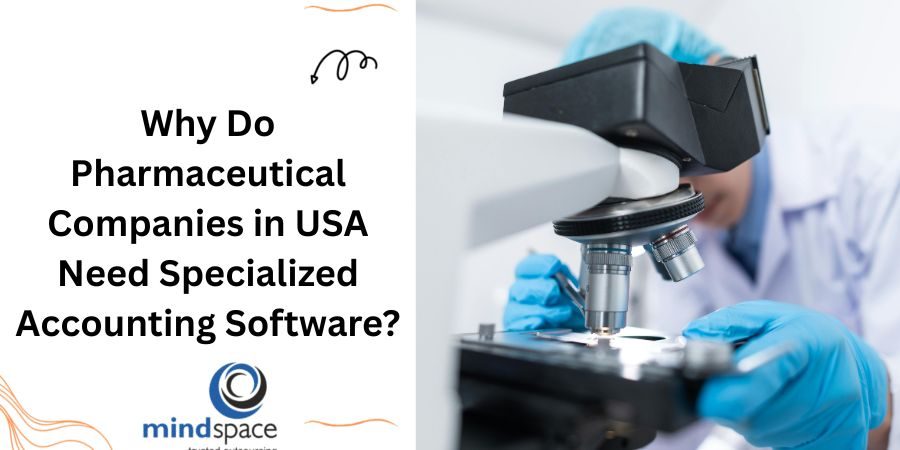Why Do Pharmaceutical Companies in USA Need Specialized Accounting Software?
Introduction
Pharmaceutical businesses operate in one of the most regulated and complex industries. Managing production costs, R&D expenses, clinical trials, and inventory valuation requires a level of precision that traditional accounting systems often can’t handle. That’s where specialized accounting software steps in, not just as a financial tool, but as a structured way to maintain accuracy, compliance, and transparency across every transaction.
1. Financial Complexity in the Pharmaceutical Industry
Pharmaceutical firms handle a mix of revenue streams, from domestic sales to international distribution, licensing, and royalties. Each revenue line comes with different taxation, reporting standards, and cost tracking needs. A simple spreadsheet system or generic accounting program may not capture this complexity.
Specialized Accounting Software allows automated handling of cost allocations, regulatory reporting, and project-based accounting, ensuring every cent is accounted for properly.
2. Tracking Research & Development Costs Effectively
R&D is the lifeline of any pharmaceutical company, but it’s also one of the hardest areas to account for accurately. Research spending must often be tracked over multiple fiscal years, sometimes even across subsidiaries or global locations.
Customized Bookkeeping Software helps in categorizing and tagging R&D expenditures, clinical trial expenses, and lab costs under specific projects. This structured data simplifies tax credits, improves cost visibility, and aids in evaluating long-term profitability.
3. Regulatory Compliance and Audit Readiness
The pharmaceutical sector in the USA faces intense scrutiny from agencies like the FDA, IRS, and SEC. Every transaction, from procurement of chemicals to product sales, must comply with established accounting standards and reporting norms.
Specialized systems designed as accounting software for pharmaceutical companies integrate compliance modules that automatically generate audit-ready reports. They also ensure traceability for each financial transaction, which is crucial when facing external audits or regulatory reviews.
4. Managing Multi-Level Inventory and Supply Chains
Pharmaceutical supply chains are intricate, involving raw materials, intermediate compounds, packaging materials, and finished goods, all stored in multiple warehouses.
An integrated accounting tool connects inventory management directly with finance. It enables real-time tracking of material costs, wastage, and expiration losses. This not only reduces inventory discrepancies but also supports better forecasting and procurement planning.
4. Integration with Manufacturing and Distribution Systems
Pharma accounting isn’t isolated; it must sync with production, logistics, and sales. Software integration allows financial teams to view production costs, batch-wise sales, and distribution expenses in one place.
A system like the best accounting software for large business can centralize financial data across global branches and provide consolidated financial statements without manual consolidation work. For large pharmaceutical enterprises, this integration means fewer errors and faster decision-making.
5. Data Accuracy and Real-Time Insights
The pharmaceutical business runs on timelines, from production to approval to sales. Any delay in financial reporting can affect cash flow and project funding.
Modern Accounting Software provides real-time dashboards, enabling finance teams to monitor budgets, receivables, and operational costs live. With automated reconciliation and instant reporting, data accuracy improves dramatically, reducing the scope of manual intervention.
6. Cost Control and Profitability Analysis
Given the massive investments in production, testing, and distribution, pharmaceutical companies need to keep tight control over operational costs. Advanced accounting tools allow detailed cost center tracking and help analyze profitability at multiple levels, product, region, or department.
By identifying cost inefficiencies early, management can reallocate funds more strategically and maintain stronger margins even in competitive market conditions.
7. Security and Data Confidentiality
Financial data in the pharmaceutical industry includes confidential supplier contracts, pricing models, and clinical funding details. Manual or outdated systems may pose risks of data leakage or loss.
Specialized accounting platforms come with built-in data encryption, access control, and cloud backup features. These layers of protection ensure financial integrity while maintaining compliance with data security standards such as SOC 2 and GDPR.
Suggested Read: Common Challenges in Accounting for Doctors in USA and How to Overcome Them
8. Streamlined Reporting and Decision Support
When decision-makers have to approve budgets or evaluate new product launches, they need clear, consolidated reports. A robust accounting system simplifies complex data sets into actionable insights through visual dashboards and automated reporting tools.
This transparency helps management teams plan effectively, forecast revenue accurately, and allocate resources efficiently.
9. The Future of Accounting in Pharma: Automation and AI
The future of pharma finance lies in automation and AI-powered systems. Predictive analytics, automated invoice processing, and cloud-based ledgers are redefining how financial departments function.
Companies that adapt early gain agility, they can monitor costs, optimize compliance, and make decisions based on real-time financial intelligence.
Conclusion
In the ever-evolving pharmaceutical world, precision, transparency, and speed define success. Specialized accounting software provides all three, enabling companies to manage their finances with accuracy while meeting regulatory and operational demands.
For firms looking to bring efficiency and compliance under one digital roof, partnering with experienced accounting solution providers like Mindspace Outsourcing can make all the difference.
With tailored systems and a deep understanding of the industry’s financial landscape, Mindspace helps pharmaceutical companies focus more on innovation and less on accounting complexities.


